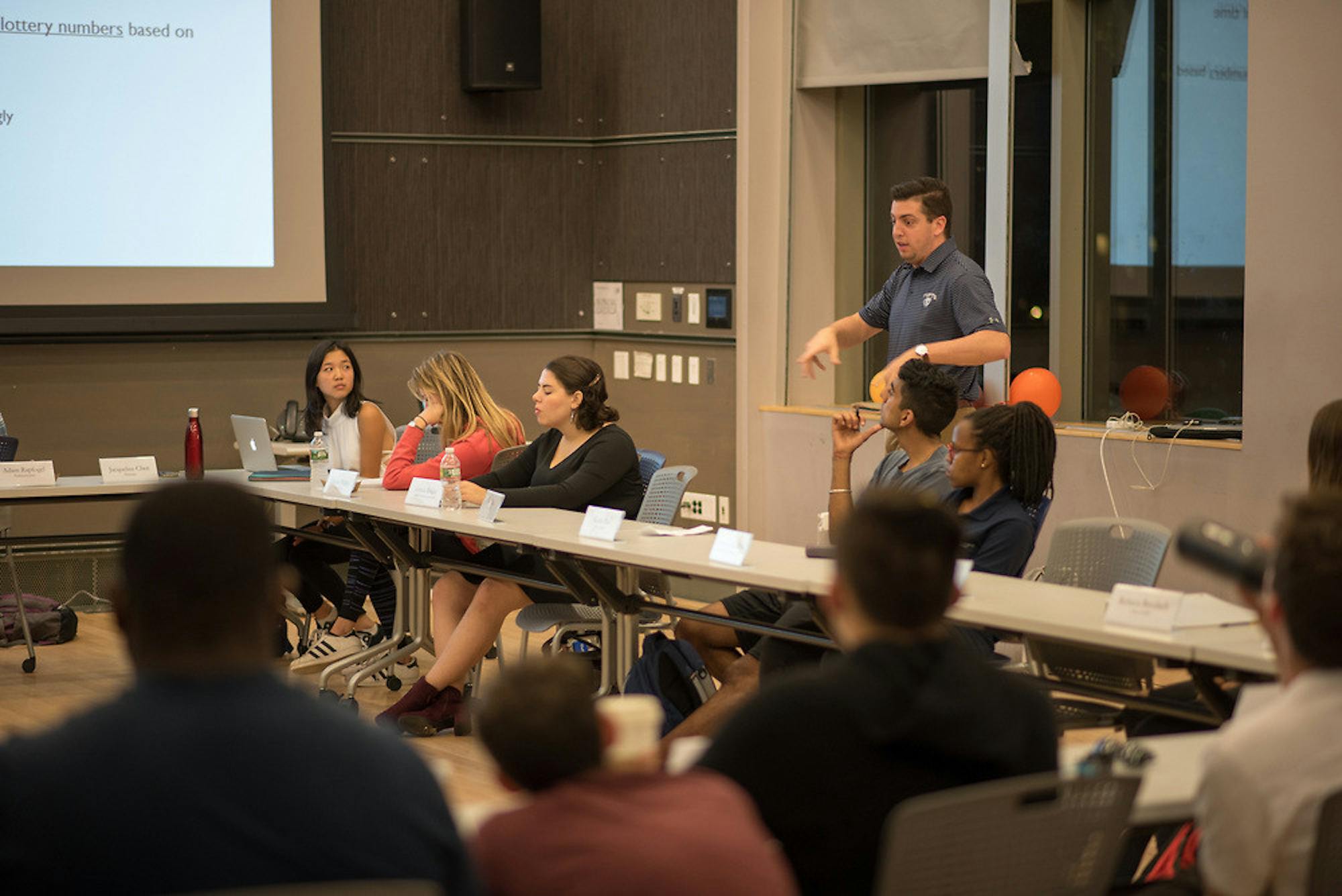The Tufts Community Union (TCU) Senate met last night in the Sophia Gordon Multipurpose Room to discuss themed housing project Capen Village, review the social scene around homecoming and hear a presentation from Associate Director of Housing Operations Matthew Austin of possible changes to the housing lottery system.
TCU President Benya Kraus opened the meeting, reporting on the progress of Capen Village, the university's housing renovation plan to increase on-campus housing opportunities for upperclassmen, first suggested by the Residential Strategies Working Group. Kraus said that the plan will entail converting Tufts’ owned houses, especially the ones located between Winthrop Street and Fairmount Street, into junior and senior dorms. She noted the first houses will become available in fall 2018, and the project will be complete by fall 2019.
Kraus also introduced the developing concepts for "identity housing," and other themed housing arrangements that will open in Capen Village. She said the village will give upperclassmen a housing solution, with a current shortage of on-campus housing for upperclassmen and rising rents in the area.
Later in the meeting, Kraus shared additional details on the plan for Capen Village. The tentative blueprint of the plan presented showed 145 beds in 13 existing and two new houses, with a total of 35 housing units and four Graduate Residence Director apartments. Kraus’ presentation noted that one of the principles of the plan is to "establish meaningfully inclusive and attractive alternatives to current social life options."
Kraus then gave the floor to Austin for a brief presentation on possible housing system reforms within the Office of Residential Life and Learning (ResLife).
The reform's main objective is to shorten the housing lottery process from its current length of two and a half months to two and a half weeks. In particular, Austin suggested requiring that all students apply for housing in December to activate their lottery numbers. Austin then explained that students will receive either a lottery number or waitlist number, and that students who are given waitlist numbers will know they should search for off-campus housing earlier than in the current system.
"We want to shorten [the housing lottery process] ... but still give the students the feeling that they are able to know exactly what's available to them," Austin told the Daily in an interview before the meeting.
Austin added that if all students interested in living on campus apply in December, ResLife can better estimate how many people are participating in housing selection. In the past, ResLife had no way of knowing which students were deciding to move off campus and therefore not participating in the lottery system until much later.
Another reform is that students will go into the housing lottery with multiple options, instead of having to restart the process for quads, doubles and singles.
In addition, Austin presented a plan to reform the lottery process for suite-style style living: in a group, only the highest lottery number will be counted in the process, instead of averaging all four. Austin said the intent was to minimize the chance of separating friends simply because they have low lottery numbers.
After Austin's presentation, there was a roughly 25-minute-long question-and-answer period.
Kraus then took the floor again to share her observations on homecoming weekend. She said that she talked to students about how they socialized during homecoming and her conversations revealed that Greek life remained the dominant organization of the Tufts social scene, at least on that day. In particular, Kraus mentioned that Greek life organizations have advantages in space, location and funding.
Next, Associate Treasurer Finn McGarghan introduced supplementary funding requests.
Tufts Hillel previously came to appeal Allocations Board's (ALBO) initial recommendation to provide $510 of Hillel's requested $1,500 for the organization's future events geared toward non-first-year members. Senate tabled the appeal at its Oct. 1 meeting due to a lack of information. At this meeting, Hillel came back with a more specified and itemized appeal, detailing how it will spend the funding. There was a brief debate on the appeal, and then the body then voted to provide $1,051.
Tufts Financial Group (TFG) had appealed ALBO's initial recommendation to provide $2,375 in funding for its upcoming networking trip to New York. However, TFG withheld its appeal and didn't make its scheduled appearance before the body today. The body matched ALBO's recommendation to provide $2,375 in funding to cover the transportation cost.
Next, the body voted to match ALBO's initial recommendations for following groups: $2,120 in funding to oSTEM for their travel to the oSTEM National Conference in Chicago, $225 to Partners in Health Engage for its film screening and $110 to French Society for biweekly coffee meetings.
After supplementary funding, Vice President Anna Del Castillo opened for floor for committee updates, but there were no significant updates from the committees according to their chairs. Finally, TCU Senate Parliamentarian Adam Rapfogel urged the senators to encourage the students to come up with resolutions, noting that the Senate has not heard any since the beginning of the current year.
UPDATE: This article has been updated to clarify Del Castillo and Rapfogel's actions during the meeting.
TCU Senate discusses plans for upperclassmen village, housing lottery reform

Associate Director of Housing Operations Matthew Austin gives a brief presentation on housing lottery system reform before the Senate during its regular meeting on Oct. 15.





